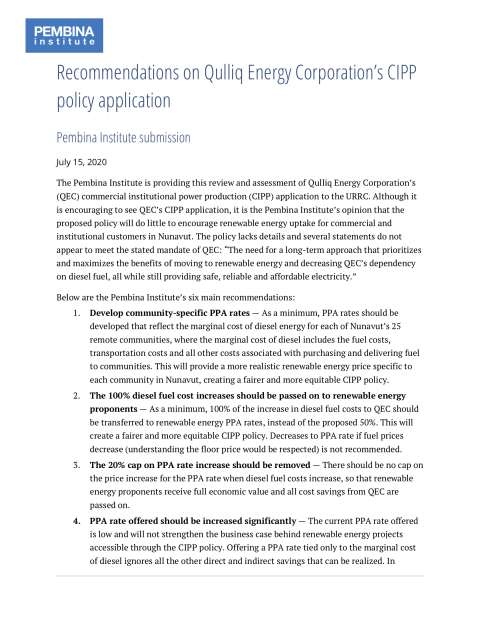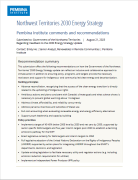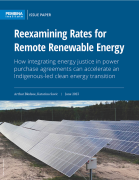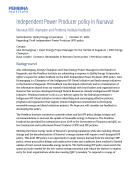The Pembina Institute is providing this review and assessment of Qulliq Energy Corporation’s (QEC) commercial institutional power production (CIPP) application to the URRC. Although it is encouraging to see QEC’s CIPP application, it is the Pembina Institute’s opinion that the proposed policy will do little to encourage renewable energy uptake for commercial and institutional customers in Nunavut. The policy lacks details and several statements do not appear to meet the stated mandate of QEC: “The need for a long-term approach that prioritizes and maximizes the benefits of moving to renewable energy and decreasing QEC’s dependency on diesel fuel, all while still providing safe, reliable and affordable electricity.”
The Pembina Institute’s six main recommendations are:
- Develop community-specific PPA rates — As a minimum, PPA rates should be developed that reflect the marginal cost of diesel energy for each of Nunavut’s 25 remote communities, where the marginal cost of diesel includes the fuel costs, transportation costs and all other costs associated with purchasing and delivering fuel to communities. This will provide a more realistic renewable energy price specific to each community in Nunavut, creating a fairer and more equitable CIPP policy.
- The 100% diesel fuel cost increases should be passed on to renewable energy proponents — As a minimum, 100% of the increase in diesel fuel costs to QEC should be transferred to renewable energy PPA rates, instead of the proposed 50%. This will create a fairer and more equitable CIPP policy. Decreases to PPA rate if fuel prices decrease (understanding the floor price would be respected) is not recommended.
- The 20% cap on PPA rate increase should be removed — There should be no cap on the price increase for the PPA rate when diesel fuel costs increase, so that renewable energy proponents receive full economic value and all cost savings from QEC are passed on.
- PPA rate offered should be increased significantly — The current PPA rate offered is low and will not strengthen the business case behind renewable energy projects accessible through the CIPP policy. Offering a PPA rate tied only to the marginal cost of diesel ignores all the other direct and indirect savings that can be realized. In situations with low PPA rates and high project development costs in remote communities, project proponents typically seek grant or equity funding to complement the PPA rate. This will typically create double dependency on external revenue sources, increase project complexity, lengthen timelines for project development, and increase risk to proponent. An absolute minimum starting PPA rate of $0.40 per kWh (based on operation and maintenance savings) must be considered if an average PPA rate is to be used. Further, economic considerations, economic savings from subsidies and other benefits of renewable energy must also be studied and included; this will increase the PPA beyond this suggested minimum rate.
- PPA rates should include an energy storage component — PPA rates should account for renewable energy systems that include a battery energy storage (BES) component and when so, provide an additional allowance in the PPA rate for this (a BES “adder”). The integration of battery energy storage facilitates alignment between demand fluctuations and intermittency of the renewables, providing grid stability and adding operational certainty for QEC.
- Ensure grid reliability for projects — The CIPP policy must clearly outline the need for a grid impact study and who is responsible for completing this work. A good CIPP policy design would not put all the onus on the renewable energy proponent, but would explore collaborative options to carry out this responsibility.
A strengthened policy will facilitate more renewable energy projects, especially Inuit-led ones. Pembina encourages more engagement and collaboration in addressing this policy and QEC’s upcoming utility-scale IPP policy. As part of our policy work in the Indigenous Off-Diesel Initiative, we would be pleased to be involved in ongoing stakeholder sessions, to support a more transparent and inclusive process to find solutions. We believe that innovative steps can be implemented that will result in renewable energy uptake driven by strong policy.
Other resources
- First set of recommendations (March 2019) to QEC to consider as they began developing their IPP policy
- Joint submission with WWF and NNC (September 2020) to the Government of Nunavut on what role they could play in improving the CIPP policy.
- Recommendations to the Government of Nunavut to accelerate clean energy projects offers seven recommendations on how to improve policies so that they can accelerate the development of Inuit-led clean energy projects (February 2022)







